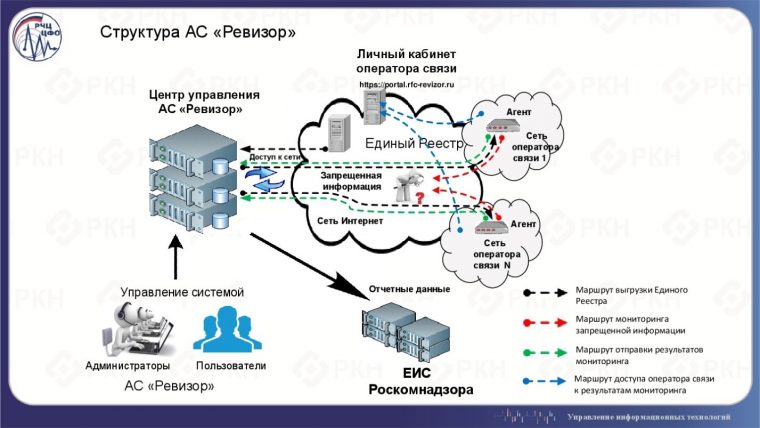
Yesterday on Habré news was published that
a lawsuit was filed against Roskomnadzor. In fact, this is not the first or the last lawsuit filed by ordinary users or companies against the agency. Organizations are less satisfied with the actions, even large business, which usually does not like to comment on interaction with state authorities, began to
speak in a negative way.
Today, I propose to make a small insight into history and remember who, when and why created Roskomnadzor and understand what the organization is now. By the way, this post is the first in the new rubric “Supplemental”. The purpose of creating a rubric is to talk relatively briefly about everything that may be of interest to all of us (if there is a desire, suggest topics in a personal). Well, let's go.
Who, when and why created Roskomnadzor?
The official name of the organization is the Federal Service for Supervision in the Sphere of Telecommunications, Information Technologies and Mass Communications. It was created in May 2008 at the direction of the President of Russia Dmitry Medvedev. We can say that Roskomnadzor is half of the whole: it came about as a result of the division into two bodies of the Federal Service for Supervision in the Field of Mass Communications, Communications and the Protection of Cultural Heritage (Rossvyazokhrankultura). The second half is the Federal Service for the Supervision of Compliance with Legislation in the Field of the Protection of Cultural Heritage (Rosokhrankultura), which came under the authority of the Ministry of Culture.
Initially, Roskomnadzor was referred to as Rossvyazkomnadzor, since the official name of the body until December 3, 2008 was the Federal Service for Supervision in the Field of Communications and Mass Communications. Well, on December 3, Rossvyazkomnadzor was officially transformed into the Federal Service for Supervision in the Field of Communications, Information Technologies and Mass Communications.
What should Roskomnadzor do?
The tasks of the department include:
- Compliance with the Russian legislation in the field of communications, information technology and media;
- Supervision of personal data protection in accordance with the law on personal data in Russia;
- The organization of the radio frequency service.
Has Alexander Zharov always been the head of Roskomnadzor?
Not at all. Boris Boyarskov became the first head of the organ that was formed in May 2008. He previously headed a single unit, which after and became two halves. Just six months later, Sergei Sitnikov, who had worked as Boyarskov’s deputy since July 2007, became the head.
Zharov became the head of Roskomnadzor on May 3, 2012. Prior to that, he served as Deputy Minister of Communications and Mass Communications of Russia.
And what about the budget?
It is quite large, although it does not increase by itself. So, in 2014, Roskomnadzor received 8.5 billion rubles, in 2015 and 2016 already 9.6 billion rubles, and in 2017 - again 8.5 billion.
Like most government agencies, Roskomnadzor receives funds from the state budget of the Russian Federation.
How many people work in Roskomnadzor?
In 2016, the organization had 159 people (central office). Most likely, even now the number of employees of the department does not exceed 200 people. At the same time there are also employees of territorial administrations. The maximum staffing level of Roskomnadzor in 2017
was 2,718 people (as of January 1, 2017, without personnel for the protection and maintenance of buildings). More detailed data on the dynamics of the regular number is given
here (thanks to
Revetements_Etales ).
As for wages, on average it is 75 thousand rubles.

How to enter the service in Roskomnadzor? In the manner prescribed by law. Under the link - provisions on public service.
When did the blocking start?
In 2012 and 2013, Roskomnadzor was not particularly highlighted (although in 2012, several Wikipedia articles were included in the Unified Register of Banned Sites). It has become a media organization since 2014, when it began to issue warnings to various federal-scale media outlets (Lenta.ru, Ekho Moskvy and others) according to interviews with persons who are heads of organizations prohibited in the Russian Federation. This is primarily about the “Right Sector” (the organization’s activities are banned on the territory of the Russian Federation, it is considered extremist).
In 2014, blocking of sites of opposition publications began (for example, Alexey Navalny’s blog). This was followed by blocking "pirated" sites, including RuTracker, social networks (LInkedIn) and other services (SlideShare, BlackBerry Messenger, Imo, Line, and Vchat).
Since 2017, the conflict with Telegram, an instant messenger who Roskomnadzor requires encryption keys, has been actively developing, so that Russian law enforcement officers have access to the user correspondence history. The history of relations between the ministry and Telegram can be traced, including on Habré - articles and news are regularly published about it.
Who is blocking websites and services recognized by Roskomnadzor as illegal?

Roskomnadzor itself cannot block anything, the department applies a number of legislative tools to block resources and services by telecom operators - of any scale and region. For this purpose, the “
Information system of interaction between Roskomnadzor and communication operators ” has been created. Both the courts, the prosecutor's office and ... In general, it is easier to mention those who do not take part in this scheme.
Does the activities of Roskomnadzor benefit?
Under the statement of employees of department - yes. Zharov repeatedly claimed that Roskomnadzor is successfully fighting pirates, which means that domestic authors of music, books, software and other content get their money, avoiding theft of funds by pirates.
Zharov also said that Roskomnadzor influenced Rutracker’s work, significantly reducing the resource’s income level and the number of its users, and Telegram’s work, which almost leads to a miserable existence after blocking.
In fact, that Rutracker, that Telegram feel good. But due to massive blockages, the business in the Russian Federation alone this year has already lost about $ 1 billion, thousands of resources have suffered. At various times, various media outlets, ABBYY Lingvo, sales of CTP policies and cinema tickets, smart TVs, trackers and smart cameras, Google maps and even
presidential grants fund did not work.
Something strange is happening in the department itself - for example, in October last year, three Roskomnadzor employees at once,
including the press secretary of Vadim Ampelonsky, received accusations of fraud under article 165 of the Criminal Code of the Russian Federation (Causing property damage by deception or abuse of trust).
Well, do not forget about the billion-dollar budget of Roskomnadzor, which is formed at the expense of taxpayers.
Thus, the question asked in the subheading above is rather a rhetorical one.